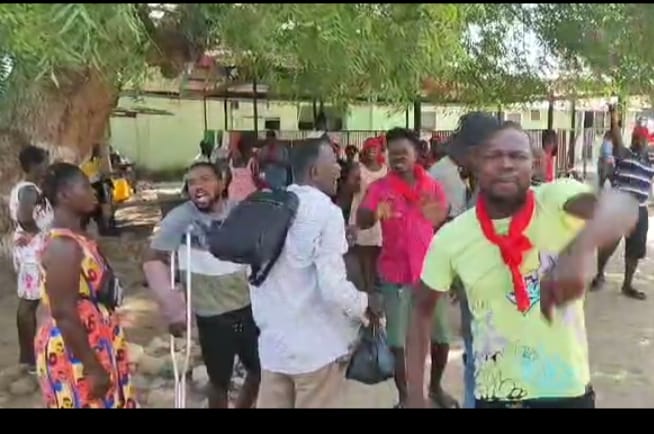The Effutu constituency, a stronghold of the National Democratic Congress (NDC) in Ghana, is currently embroiled in internal strife and discontent following the recent appointment announcements by President John Dramani Mahama. Party supporters, particularly within the constituency, are expressing deep frustration over the perceived neglect of their parliamentary candidate, James Kofi Annan, who has been overlooked for any governmental position. This omission has sparked protests and acts of vandalism at the constituency office, highlighting the escalating tension and disappointment among the grassroots members of the party. The core issue revolves around a sense of unfulfilled expectations and a perceived lack of recognition for Annan’s contributions to the party, particularly during the challenging election period.
The aggrieved supporters, including prominent women’s groups within the constituency, argue that Annan’s dedication and hard work during the election campaign warrant a significant appointment within the government. They feel that their sacrifices and efforts have not been adequately acknowledged or rewarded by the party leadership. This perceived betrayal has led to public displays of anger and frustration, with some supporters directly calling upon key figures within the NDC, such as Ato Forson and Vice President Naana Opoku Agyemang, to intervene on Annan’s behalf. The underlying sentiment is one of disillusionment, as they contrast their current situation with the perceived triumphalism of their political rivals, the New Patriotic Party (NPP), who they feel are mocking their lack of representation in the government despite the NDC’s victory.
The supporters’ discontent is not merely about political patronage; it’s rooted in their belief in Annan’s capabilities and his potential to contribute meaningfully to national development. They cite the significant developmental projects initiated by the NPP’s incumbent MP, Alex Afenyo-Markin, after Annan’s emergence as the NDC parliamentary candidate, as evidence of his political weight and the perceived threat he posed to the opposition. This narrative emphasizes Annan’s effectiveness and influence, bolstering their argument that he deserves a prominent position within the government. The fact that Afenyo-Markin seemingly intensified development efforts in the constituency after Annan’s candidacy suggests, in their view, a recognition of Annan’s potential even by the opposing party.
Adding to the complexity of the situation is the timing of the appointments. With the majority of ministerial and CEO positions already filled, the window of opportunity for Annan to receive a suitable appointment is rapidly closing. This perceived inaction by the party leadership has amplified the sense of urgency and frustration among the Effutu NDC supporters, further fueling their protests and demands for immediate action. The fear is that Annan’s contributions will be ultimately ignored, undermining the morale of the constituency and potentially impacting the party’s long-term prospects in the area. This concern underscores the strategic importance of addressing the situation promptly to prevent further escalation of the conflict and maintain party unity.
The protests and vocal dissatisfaction within the Effutu constituency represent a microcosm of the broader challenges faced by political parties in balancing internal power dynamics, rewarding loyalists, and managing expectations after an electoral victory. The NDC leadership is now under pressure to address the concerns of the Effutu supporters and find a way to reconcile their demands with the broader political landscape. Failure to do so risks alienating a key segment of their support base and potentially creating a rift within the party, which could have ramifications for future elections. The situation highlights the delicate balancing act required in political appointments and the importance of clear communication and transparency in managing expectations within the party ranks.
This situation also draws attention to the often-unseen dynamics within political constituencies and the impact of local politics on national governance. The Effutu constituency’s protests are a stark reminder that political success depends not only on winning elections but also on effectively managing the aspirations and expectations of the party faithful at the grassroots level. The NDC’s response to this situation will be a crucial test of its leadership and its ability to maintain party unity and address the concerns of its supporters effectively. This incident also raises broader questions about political representation, reward systems within parties, and the potential for internal dissent to undermine political stability. Finding a resolution that satisfies the Effutu constituency while maintaining broader party cohesion will be a significant challenge for the NDC leadership.


